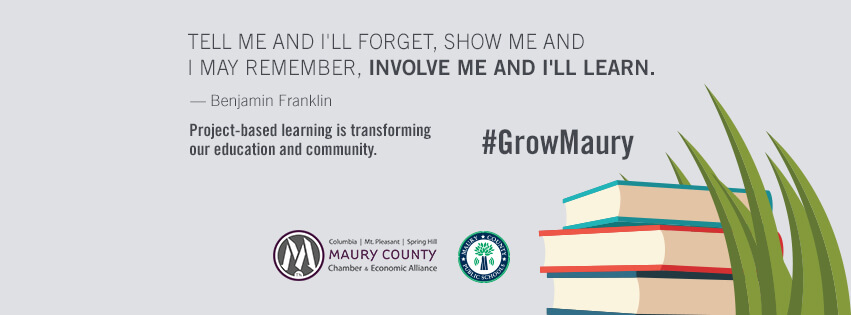By Dr. Chris Marczak
“Tell me and I forget. Teach me and I remember. Involve me and I learn.” This quote by Benjamin Franklin is the project-based learning concept.
Maury County Public Schools (MCPS) has been leading the way for innovation in education with initiatives like the “7 Keys to College and Career Readiness,” the STEAM movement and the DIPLOMA program, and project-based learning is another way the school system is transforming education.
A student-centered teaching method involving a dynamic classroom approach, project-based learning allows students to acquire a deeper knowledge through active exploration of real-world challenges and problems. This approach encourages students to develop critical thinking skills and become more actively engaged in their education.
With this approach, students have increased control over their learning with teachers serving as coaches and facilitators. Students develop a question and are guided through research under the teacher’s supervision, cultivating independent thinkers and learners.
At MCPS, we are preparing students for college and the 21st century workforce, and to do so, students need to acquire 21st century skills like technological literacy, problem-solving and the ability to work in a collaborative and global environment.
Project-based learning is an effective way to provide students with these skills.
Last quarter, the Grow Maury Initiative, a collaboration between the Maury Chamber and Economic Alliance and MCPS, focused on the theme of technology in the classroom and how the school system is using this technology to prepare students for the technological skills needed in today’s workforce. Technology creates independence by allowing students to have an active role in their own learning and provides interesting instruction that is relevant to students and keeps them engaged. Combined with technology, project-based learning provides a winning combination.
Project-based learning gives students access to technology tools that will help them conduct research, organize tasks and communicate with classmates.
This approach also integrates well with the STEAM (Science, Technology, Engineering, Arts, Mathematics) movement. Last year, Maury County launched the country’s first K-12 STEAM campus known as the Mount Pleasant Arts Innovation Zone. And this year, Maury County held its first STEAM Summit event—a day filled with experiments, talks from former NASA engineers and hands-on demonstrations of advanced technologies by local businesses. Project-based learning is the method in how STEAM is delivered.
Instead of lectures, project-based learning immerses students in hands-on, real-world projects in STEAM fields—where a majority of high-paying jobs and career fields exist. Through partnerships and collaboration with local businesses and business professionals in the community, students will have the opportunity to apply what they learn to real-life scenarios.
In recent years, the county has become a leader of growth in the region as the fourth fastest-growing county, but also with a record number of job increases within the community. Having Maury County graduates prepared for the workforce and to fill these jobs will provide a flourishing economy.
The end result of project-based learning, though, is achievement. While it will eventually lead students to be better prepared for the 21st century workforce, we expect to see improvements in standardized test scores. A 1999 study by the Center for Research in Educational Policy at the University of Memphis and University of Tennessee at Knoxville found that students using project-based learning and technology had improved test scores in all subject areas over a two-year period on the Tennessee Value-Added Assessment System and outperformed control schools by 26 percent. Many more studies exist as schools continue to make the transition from traditional classroom learning.
Project-based learning will also set students on track to achieve the “7 Keys for College and Career Readiness,” as ACT scores improve and students become more proficient in math and English and ultimately become better equipped for their next stage of life—unlocking their potential.
To make this transformation a reality, we rely on the support of our hard-working teachers, parents and community members.
To learn more about the strides that Maury County is making in education or to get involved, visit http://mauryalliance.com/grow-maury/.

